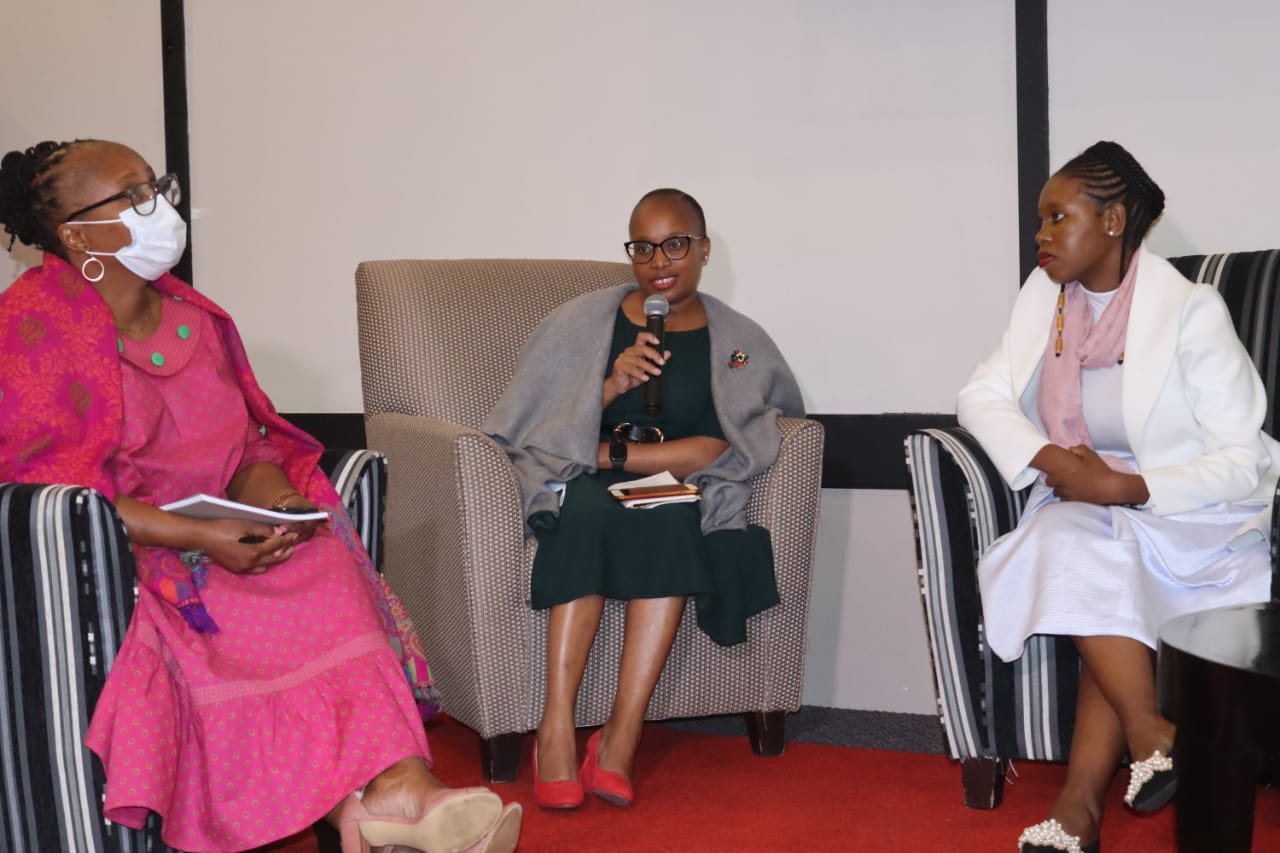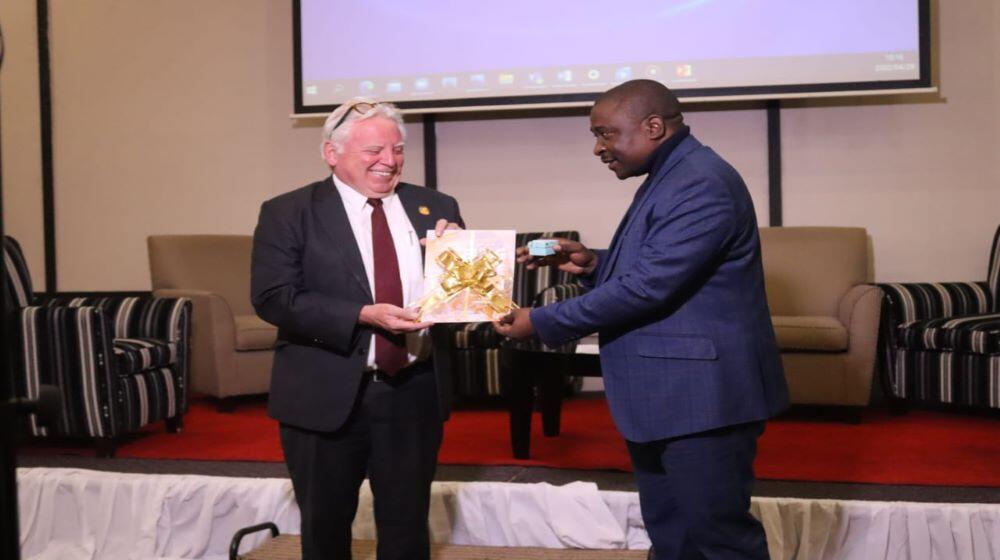The high rate of obstetric and gynaecological admissions due to abortion from 2019-2021 were among issues that came out highly during the Launch of the State of the World Population Report (2022) in Maseru on 29th April, 2022.
Speaking during the launch of the annual UNFPA flagship report, whose theme this year is “Seeing the Unseen: The case for action in the neglected crisis of unintended pregnancy,” UNFPA Representative to Lesotho Dr Marc Derveeuw, made a presentation summarizing the report, but also contextualised the report and showed the situation in Lesotho through data obtained from one hospital covering the first quarter (January – March) of 2019, 2020, 2022. The data revealed that the percentage of obstetric and gynaecological admissions due to abortion were highest among adolescent girls aged 10 -14 at 35.71 percent. Women aged between 25 -49 also rank high at 15.53 percent followed by those aged between 20 -24 at 10.06 percent. The Berea district came out to be the highest in number of obstetric and gynaecological admissions due to abortion during the first quarter of the three years at 184 in 2020 followed by Maseru at 130 during the same year.
The Representative therefore emphasized the need to prioritize prevention of unintended pregnancies as they are preventable, “if we empower women and girls to make affirmative decisions about sexuality and motherhood.” He added, “For this to happen we must; educate young people about sexuality and reproductive health and rights, not only about HIV and guarantee access to the broadest range of contraceptives and quality sexual and reproductive health care. He also highlighted that Pregnancy is a choice and contraception is also a choice. He then called for investment in newer contraceptive methods, reduction of gender inequality, Increased access to education and employment opportunities for women and girls to encourage them to postpone pregnancy.

Speaking at the same occasion, which was attended by, among others, Parliamentarians, Representatives from Non-Governmental Organisations, Diplomats and senior government officials, the Minister of Development Planning Honourable Selibe Mochoboroane also reaffirmed that one of the noticeable effects of unintended pregnancy in Lesotho is the issue of abortion. This, he said, has caused numerous mortalities of which maternal is predominant (618/100 000), adding that destitution and orphan hood are also critical effects due to maternal mortality brought about by unintended pregnancy. He further stated that there is an issue of school dropouts due to unintended pregnancy to girls, which leads to the problem of unemployment, adding; “It is a well-known fact that lower educational attainment correlates directly with unemployment.”
“In the midst of all these challenges, the issue of development becomes improbable due to high number of orphans and deaths of women and girls. We should note that national development agenda cannot be achieved until women and girls are actively involved in economic activities of the country,” he emphasized. The Minister further stated that the government of Lesotho strives to achieve sexual and reproductive health and reproductive rights for all through education, laws and policies. This, he said, is apparent, as the Government has tried to make sexual and reproductive health services accessible to all since the 1994 ICPD Cairo Summit.
The highlight of the launch was a panel discussion based on the theme of the report. Some of the panellists narrated their personal testimonies on unintended pregnancies. As one of them, Ms Lefulesele Mohaese noted, “Unintended pregnancies can throw you off track, especially when you are a woman. For me going back to the job structure was a struggle after my unintended pregnancy.”
Jeminah Khosi who said she unintentionally got pregnant twice while still at university said, “the unintended pregnancy robbed me of my opportunity to transition properly from teenage hood into a mature woman. I became a mother prematurely.”
Speaking on behalf of young people, Tsepang Maboee highlighted the challenges faced by young people that lead to them being pregnant unintentionally such as misinformation and myths regarding contraceptives.
Advocate Rethabile Thakane Shale who spoke on the relationship between Gender Based Violence and unintended pregnancies, highlighted the issue of stealthing, that is, when a man purposely removes or damages a condom during sexual contact without telling his partner as people get pregnant from this type of situation and also early marriages which sometimes become a cause and aftereffect of unintended pregnancy. “A 16-year-old girl gets pregnant and out of embarrassment the family marries her off to whoever got her pregnant. When you are married early more often than not the balance of power in that relationship is that the man often has more power and so you cannot negotiate condom and contraceptives use. All these also happen because women especially in Lesotho still do not have bodily autonomy -the right over their bodies, and are therefore not able to negotiate anything.” She said a lot of unintended pregnancies therefore end up in abortions which are illegal and unsafe, and sometimes lead to loss of life.
Giving a men’s perspective, Mr Tlali Matela said unintended pregnancies also have an emotional bearing on males. He said they also affect males economically particularly since culturally males are expected to provide, adding that it is also burdening as a young male to have to tell parents about impregnating someone. He therefore stressed the importance of involving men in addressing issues around unintended pregnancies, as fathers, as spouses, as friends and as brothers.
On behalf of the Ministry of Health, Mrs ‘Matsepeli Nchephe reiterated that unintended pregnancies are a concern to the country. She noted that the unmet need for family planning is higher among adolescents at 28.9 percent while it is 18 percent for other women. She said in as much as the government is doing a lot to address the issue, such as the introduction of Comprehensive Sexuality Education (CSE), community based distribution of contraceptives and self-injection depo, there is still more that needs to be done.
At the occasion, guests were also entertained by a local musician who sang the SDG and Reproductive Health songs.
The ground-breaking report, “Seeing the Unseen: The case for action in the neglected crisis of unintended pregnancy,” warns that this human rights crisis has profound consequences for societies, women and girls and global health. Over 60 percent of unintended pregnancies end in abortion and an estimated 45 per cent of all abortions are unsafe, causing 5 – 13 per cent of all maternal deaths, thereby having a major impact on the world’s ability to reach the Sustainable Development Goals.


